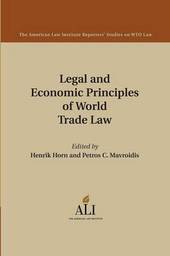
|
Legal and Economic Principles of World Trade Law
Paperback / softback
Main Details
| Title |
Legal and Economic Principles of World Trade Law
|
| Authors and Contributors |
Prepared for publication by American Law Institute
|
|
Edited by Henrik Horn
|
|
Edited by Petros C. Mavroidis
|
| Series | The American Law Institute Reporters Studies on WTO Law |
|---|
| Physical Properties |
| Format:Paperback / softback | | Pages:380 | | Dimensions(mm): Height 230,Width 152 |
|
| Category/Genre | International economics |
|---|
| ISBN/Barcode |
9781107459649
|
| Classifications | Dewey:343.087 |
|---|
| Audience | | Professional & Vocational | |
|---|
| Illustrations |
Worked examples or Exercises
|
|
Publishing Details |
| Publisher |
Cambridge University Press
|
| Imprint |
Cambridge University Press
|
| Publication Date |
1 January 2015 |
| Publication Country |
United Kingdom
|
Description
The World Trade Organization (WTO) Agreement covers international commerce in goods and services including measures that directly affect trade, such as import tariffs and quotas, and almost any type of internal measure with an impact on trade. Legal and Economic Principles of World Trade Law contributes to the analysis of the texts of World Trade Law in law and economics, reporting work done to identify improvements to the interpretation of the Agreement. It starts with background studies, the first summarizes The Genesis of the GATT, which highlights the negotiating history of the GATT 1947-8; the second introduces the economics of trade agreements. These are followed by two main studies. The first, authored by Bagwell, Staiger and Sykes, discusses legal and economic aspects of the GATT regulation of border policy instruments, such as import tariffs and import quotas. The second, written by Grossman, Horn and Mavroidis, focuses on the core provision for the regulation of domestic policy instruments - the National Treatment principles in Art. III GATT.
Author Biography
The American Law Institute is the leading independent organization in the United States producing scholarly work to clarify, modernize, and otherwise improve the law. The Institute (made up of 4,000 lawyers, judges and law professors of the highest qualifications) drafts, discusses, revises and publishes Restatements of the Law, model statutes and principles of law that are enormously influential in the courts and legislatures, as well as in legal scholarship and education.
|